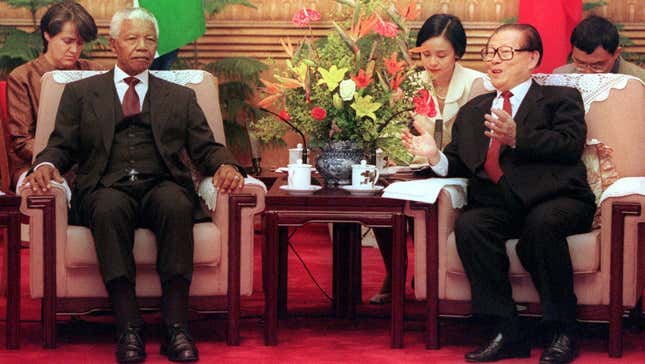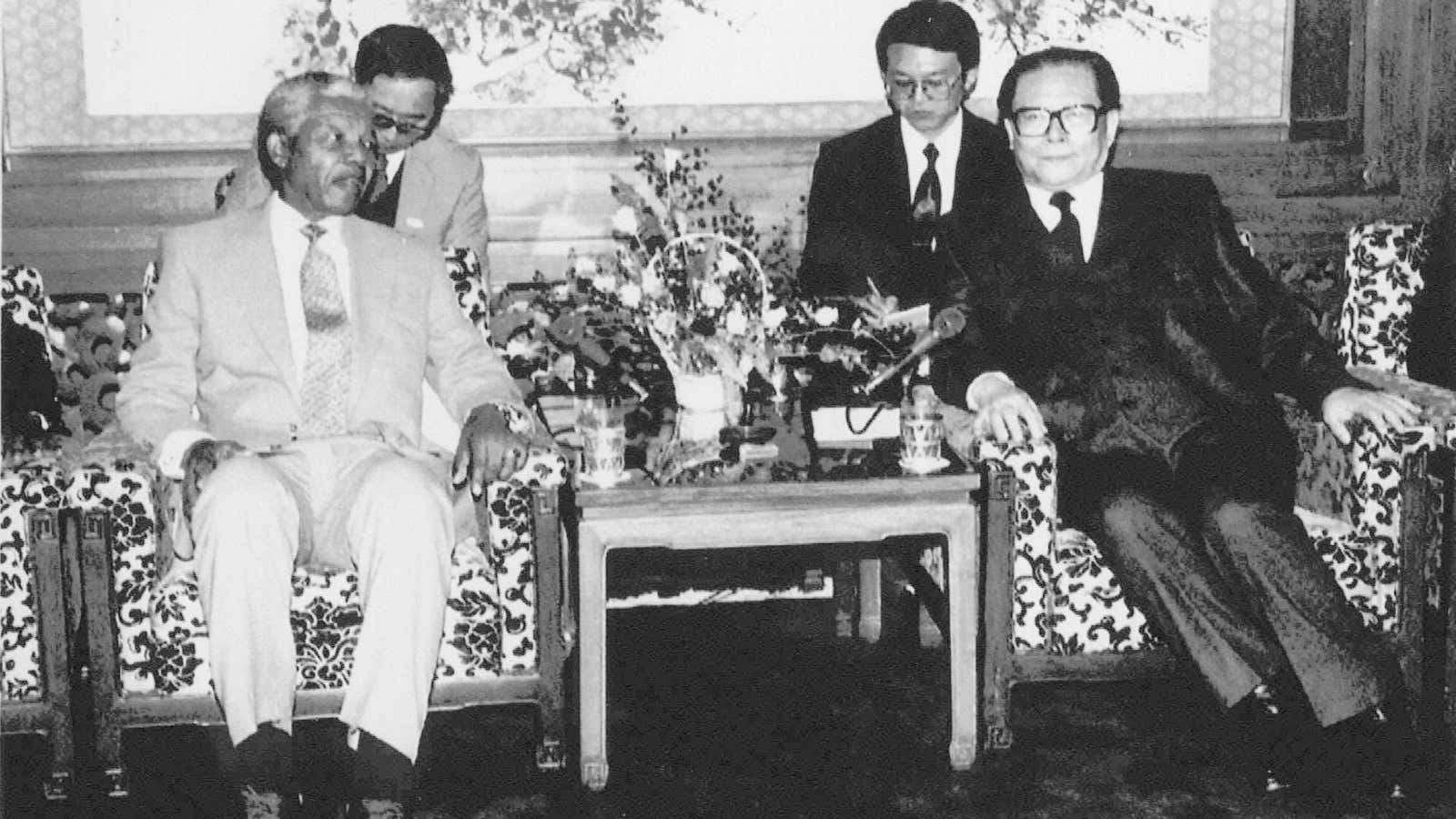It is 20 years since South Africa and the People’s Republic of China, or mainland China, established formal diplomatic ties. Though China is now South Africa’s largest trading partner and a co-member of the BRICS grouping which also includes Brazil, Russia and India, relations between South Africa and China were not always so close.
When president Nelson Mandela took office in May 1994, he was immediately confronted with a vexing foreign policy problem: how to balance the country’s diplomatic relations with Taiwan—inherited from the apartheid government—with Beijing’s “One China principle”. This principle holds that Taiwan is part of China, and that Beijing is the only legitimate authority over all of China.
In a recently published paper based on archival material as well as interviews with former South African officials, we shed light on the texture and timing of the decision to recognize China and cut ties with Taiwan.
After Mandela’s inauguration it was widely expected that the new, democratic South Africa would soon recognize mainland China. The world’s most populous country had a rapidly growing economy and significant international influence, including a permanent seat on the United Nations Security Council. At the time 159 states recognized the People’s Republic of China, while only 29 had diplomatic relations with Taiwan.
Rather than making a quick switch, it took Mandela 30 months to announce the change from Taipei to Beijing. Our analysis shows that internal pressure from the African National Congress (ANC) as well as external pressure from China influenced Mandela’s choice.

Dual recognition
Soon after Mandela became president South Africa issued a document outlining the administration’s approach:
President Mandela has expressed full confidence in the leaders of the People’s Republic of China and the Republic of China (Taiwan) and support for their efforts to resolve the China question … It is on this basis that the South African government would hope to strengthen and improve the relationship with the People’s Republic of China on the one hand, and the Republic of China on the other.
The Mandela administration had chosen not to choose. Instead, its approach was an unprecedented attempt at dual recognition. There were several reasons for this.
First, Taiwan, was South Africa’s sixth largest trading partner and a major investor. When its then president and foreign minister met Mandela the day after his inauguration, they expressed eagerness to provide economic assistance to South Africa — “provided diplomatic ties remain intact”.
Second, Taiwan had donated $10 million to the ANC’s election campaign in 1993. Aziz Pahad, the former Deputy Minister of Foreign Affairs, recalls that Mandela believed
you can’t dump friends after receiving so much assistance from them…
A sense of loyalty combined with lucrative offers of assistance persuaded Mandela to continue ties with Taiwan.
Mandela’s uncertainty about the future of mainland China was another factor. Two cabinet ministers — Zola Skweyiya and Pallo Jordan—pointed out that the Soviet Union’s unexpected collapse loomed large in Mandela’s thinking about China’s longevity. Jordan commented:
You had the Soviet Union…and then one day it was gone. And I think he had the sense that the same sort of thing might happen in the case of China…
Because of China’s power and political prominence on the world stage all South African leaders understood that the new South Africa would eventually move to recognise Beijing. But, as part of this move, did South Africa need to abandon Taipei?
Most ANC officials and bureaucrats in the department of Foreign Affairs thought China would never accept dual recognition, but a few scholars and senior officials believed that Mandela’s global stardom could help South Africa achieve what no other country had – formal relations with both Chinas.
Reasons for the switch
After two and half years of attempting dual recognition, Mandela announced that Pretoria would switch relations from Taipei to Beijing.
One key reason for this move was a strong push to recognize China from within the ANC. In 1996 Foreign Minister Alfred Nzo led a fact-finding mission to Beijing. He reported that “the Chinese leadership had made it patently clear that they will never accept dual recognition”.
This assessment confirmed the majority view of the ANC’s National Executive Committee (NEC) – the party’s highest decision making body between national conferences. Max Sisulu, an NEC member who accompanied Nzo on the mission, explains:
We had made our decision collectively, so the ANC had decided that this is the best way to go…And so, Madiba had to live with it. That’s the nature of a democracy.
Another push factor was increasing pressure from China. After 30 months of waiting China became impatient, even irate, when Mandela referred to Taiwan as a country in August 1996, precipitating criticism in Chinese state media.
Early in November 1996, Nzo sent a letter to Mandela that expressed “deep concern” that bilateral relations between South Africa and the mainland China had deteriorated to new lows. Nzo listed punitive measures China was considering if South Africa did not make the switch, including rescinding its “most favoured nation” trading status .
Rusty Evans, then Foreign Affairs director-general, recalled that China
Put it starkly to us that: ‘You either break off the relations now or you count us out’. Very much so. They played quite hardball at the end.
A decision had to be made. Prompted by the ANC and pushed by Beijing, late in November 1996 Mandela announced the move he had long “agonised over”. After lengthy negotiations between Pretoria and Beijing formal relations began in 1998.
Power politics
South Africa’s China choice shows how political and economic clout can aid a state in achieving its objectives. In the mid-1990s South Africa had large reserves of moral authority derived from its relatively peaceful transition, and Mandela’s widespread popularity and respect. But this was not enough to overcome China’s global influence, importance, and insistence on the One China principle.
Then, as now, South Africa could ill afford to be on the wrong side of China.
The writer thanks Claire Hurst for her assistance on this article and the research support.
Christopher Williams, Bradlow Fellow at the South African Institute for International Affairs and Visiting Researcher in the International Relations Department, University of the Witwatersrand
This article was originally published on The Conversation. Read the original article.
